Imagine yourself surrounded by thousands of cheerful revellers dressed in traditional Bavarian attire, massive steins of golden beer held high, while brass bands play merry tunes that echo through enormous festival tents. Welcome to Oktoberfest in Munich, Germany—the legendary celebration that has captured the hearts of travellers worldwide for over two centuries.
This comprehensive guide will prepare you for an unforgettable experience at the world’s largest folk festival, ensuring you navigate the festivities like a seasoned local rather than a bewildered first-timer – as long as you can control your facial expressions. From beer tents to carnival rides, we’ve covered all the details you need for your first Oktoberfest adventure.
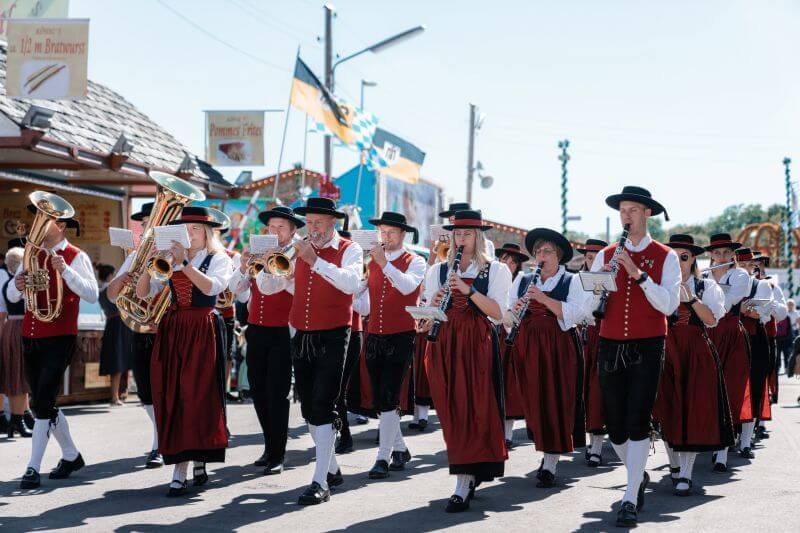
What began in 1810 as a public celebration of Crown Prince Ludwig’s marriage to Princess Therese of Saxony-Hildburghausen has transformed into a 16-18 day extravaganza that defines Bavarian culture. The inaugural festival featured a horse race and agricultural displays to honour Bavaria’s rural traditions. While those elements have largely faded, what remains is a magnificent celebration that draws over six million visitors annually from every corner of the globe.
Oktoberfest Munich represents far more than just beer consumption—it’s a vibrant display of Bavarian pride, tradition, and community spirit. Locals don their finest traditional garments: men in leather Lederhosen with embroidered braces, and women in colourful Dirndls with intricately tied aprons. These aren’t mere costumes but treasured cultural attire worn with genuine pride.
The festival grounds transform into a small city of enormous beer tents, each with distinct personalities and traditions, alongside thrilling carnival rides, food stalls serving hearty Bavarian food, and carnival booths filled with souvenirs and traditional crafts. The atmosphere is electric—a perfect blend of revelry, tradition, and heartfelt gemütlichkeit (the untranslatable German concept of warmth, friendliness, and good cheer).
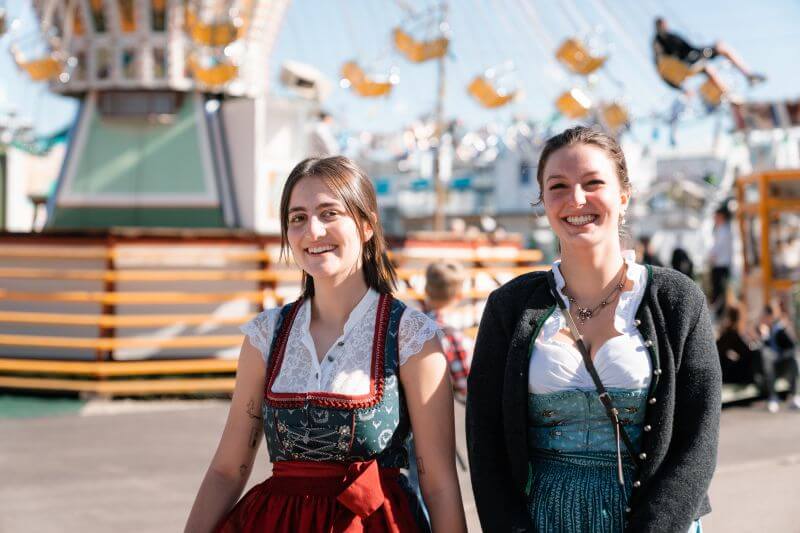
Festival Dates: Despite its name, Oktoberfest takes place primarily in late September. The folk festival typically begins on the third Saturday of September and continues for 16-18 days, ending on the first Sunday in October. The festival spans across both September and October.
Location: The festival unfolds at Theresienwiese (often abbreviated to “Wiesn” by locals), a large open space southwest of Munich’s city centre. This area, known as “Therese’s Meadow” in honour of Princess Therese, lies within the city limits yet feels like its own festive world. The fair grounds are situated within walking distance of the main train station.
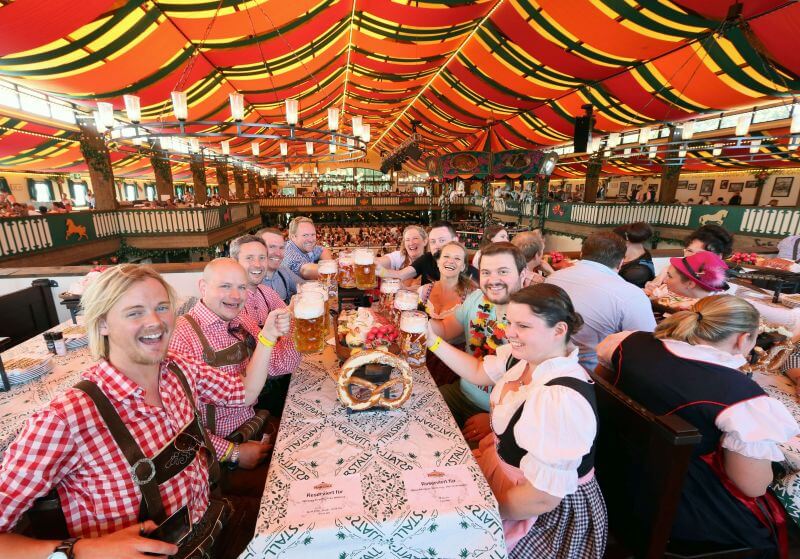
Getting There: The grounds are well-connected by public transportation:
U-Bahn (underground): Lines U4 and U5 to Theresienwiese station
U-Bahn: Lines U3 and U6 to Goetheplatz (slightly longer walk)
S-Bahn (suburban trains): Any line to Hauptbahnhof (Central Station), then a 10-minute walk
Entry Cost: One of Oktoberfest Munich Germany’s most appealing aspects is that entrance to the grounds and beer tents is completely free. You only pay for what you consume and any rides you enjoy.
Daily Schedule: The festival grounds operate from 10:00 AM to 11:30 PM (beer served until 10:30 PM), with beer tents closing at midnight. Special events include:
Opening Day: The grand parade and ceremonial tapping of the first keg by Munich’s Lord Mayor who proclaims “O’zapft is!” (“It’s tapped!”)
Traditional costume parade on the first Sunday
Concert of all Oktoberfest bands on the second Sunday
Family days with reduced prices on Tuesdays
Gun-salute on the closing Sunday
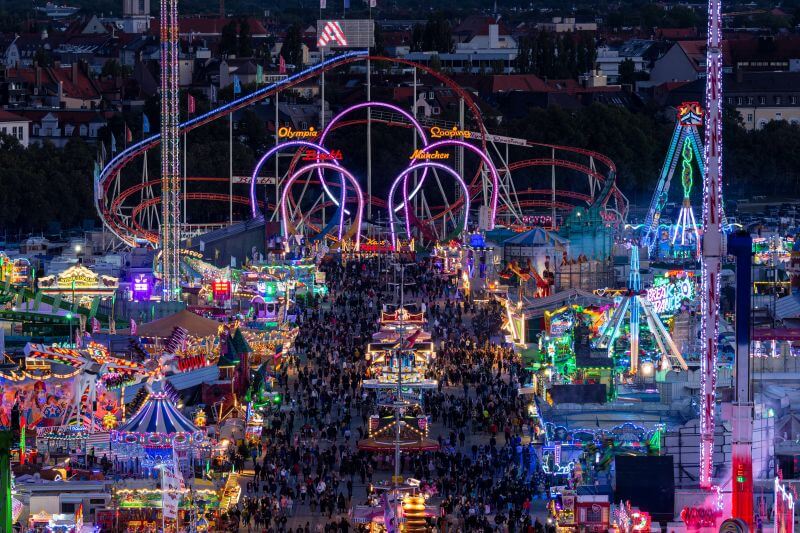
The Theresienwiese grounds cover approximately 42 hectares and transform into a vibrant small city during Oktoberfest Munich. Knowing the layout helps you navigate efficiently between attractions:
Main Beer Tent Area: The heart of the festival is dominated by 14 large tents and 21 small tents arranged primarily along two main “streets”:
The eastern strip features the Schottenhamel tent (where the opening ceremony occurs), Hofbräu, Hacker-Pschorr, and Paulaner tent
The western avenue hosts Augustiner, Löwenbräu, and Armbrustschützen tents
Each of the big tents can accommodate 5,000-10,000 people and has its own extensive beer garden outside with additional seating.
The Fairground Sections:
The southern section houses the most thrilling rides including the massive 50-meter “Olympia Looping” roller coaster with five loops
The central area features the iconic 50-meter Ferris wheel offering panoramic views of Munich and, on clear days, the Alps
The northern section contains gentler family and historic rides, games, and food stalls
Oide Wiesn: Located at the southern end, this “old Oktoberfest” area recreates the historical festival with vintage rides, traditional music, and historical exhibitions. Entry costs €4 but offers a more relaxed, authentic experience.
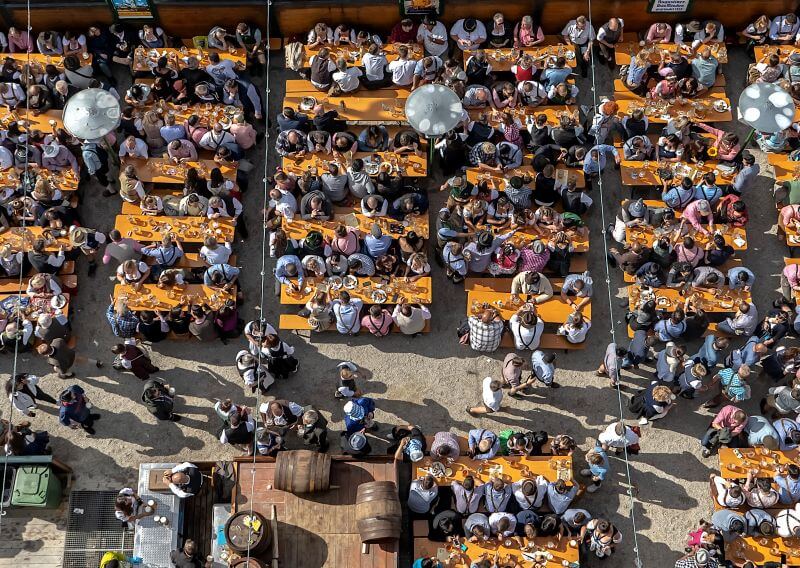
Practical Landmarks:
The Bavaria Statue: This 18.5-meter bronze figure stands at the western edge, providing an excellent meeting point and photo opportunity
The Festsäule (Festival Column): Located near the main entrance, it’s topped with the Münchner Kindl (Munich Child) symbol
Information Booths: Located at major entrances with multilingual staff, maps, and lost and found services
Medical Services: Several first aid stations are positioned throughout the grounds, clearly marked with red cross symbols
Security Checkpoints: All entrances have security screening—large bags and backpacks are not permitted
Navigation Tips:
Pick up a free map at information booths or download the official Oktoberfest app
Each tent has a unique decorated façade and symbol making them easy to identify
The grounds are organized in a logical grid pattern with numbered rows
Look for the numbered entrance gates (there are 7 main entrances) to orient yourself
The giant Ferris wheel serves as a useful landmark visible from most areas
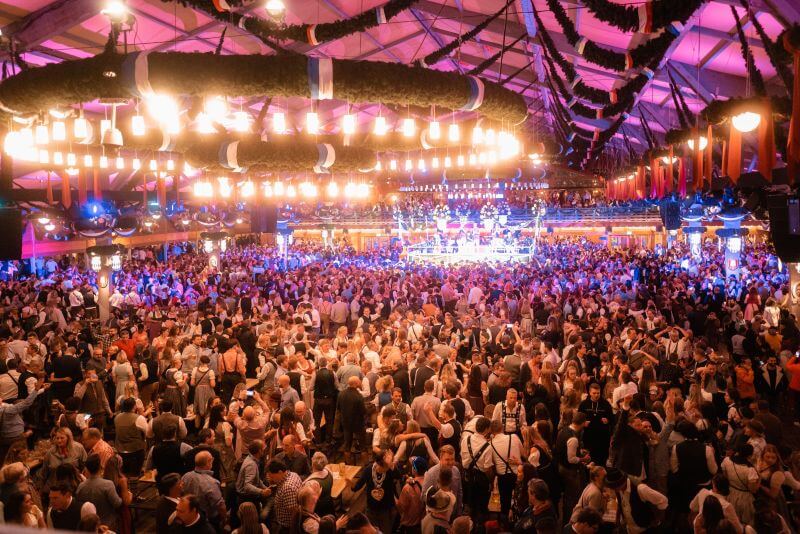
Timing Is Everything: If you want a seat in a beer tent—which you absolutely do—arrive early. On weekdays, aim to arrive by 2:00 PM, and on weekends, the earlier the better (some dedicated revellers queue from 8:00 AM!). After 2:00 PM on weekends, most tents reach capacity and implement a one-out-one-in policy. Understanding the Oktoberfest time patterns is half the fun of planning your visit.
Dress the Bavarian Part: While not mandatory, wearing traditional attire enhances your experience Oktoberfest immensely. For authentic Lederhosen or Dirndls, visit these Munich shops:
Angermaier (Rosental 10) – Quality traditional outfits
Steindl (Tal 37) – Good mid-range options
C&A and other department stores offer more affordable versions
Remember that a Dirndl apron’s bow position communicates relationship status: left means single, right means taken, centre means virgin, and back means widowed.
Beer Tent Strategy: With 14 large tents and numerous smaller ones, each with unique atmospheres, consider these popular options:
Hofbräu-Festzelt: The most international crowd, lively atmosphere
Augustiner-Festhalle: Locals’ favourite, serving beer from wooden barrels
Hacker-Festzelt: Known as “Bavarian Heaven” with beautiful painted ceiling
Schützen-Festzelt: More relaxed atmosphere, excellent food
For guaranteed seating, especially for groups of 8+, make beer tent reservations months in advance through the individual tent websites. Without table reservations, arrive early and be prepared to make friends at shared tables. Oktoberfest landlords manage their tent reservations independently, so check their individual websites.
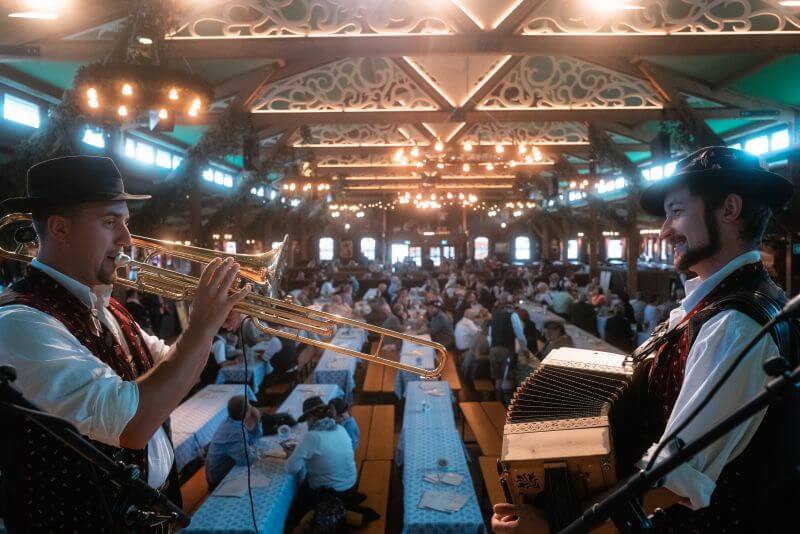
Beer Etiquette: Oktoberfest beer comes in one size—the Maß (1 litre)—and costs approximately €14-16. When toasting, make eye contact and say “Prost!” while clinking the bottom of the steins. Always pay your server directly, including a small tip (round up to the nearest euro). Remember to pace yourself—these beers are stronger than you might expect! Note that only beer from the six traditional Munich breweries is served during the festival.
Know Your Limits – The “ZwiWa” Rule: As locals say, “Zwischenwasser, Zwischenwasser, hey, hey!” (In-between water) is perhaps the most important Oktoberfest survival tip. While one Maß of beer will give you a nice buzz and two might keep you in good spirits, the danger comes when you inevitably want that third one. Alternate each beer with water to stay hydrated and clear-headed. If you’re concerned about appearances, you can always switch to non-alcoholic beer for a round—nobody will judge you, and your head will thank you the next morning!
Jacket Protection Hack: The number of jackets lost or ruined at Oktoberfest in Munich is astronomical. Don’t make the common mistake of stuffing your jacket under the beer table where it’s likely to get forgotten or soaked. Instead, bring a plastic bag to protect your jacket before hanging it under the table. This prevents damage, but doesn’t solve the forgetfulness problem! Fortunately, the festival has an excellent lost property office (“Fundbüro”) located behind the Schottenhamel tent under the sign marked “Festleitung.” This remarkable facility reunites visitors with everything from wallets and mobile phones to more unusual items like wheelchairs and even prosthetic limbs! Should you accidentally leave something behind in your beer-induced merriment, this is the place to go.
Please remember that most found items are usually only brought in the next day. As many things show up even later, the office is still open after the end of Oktoberfest.
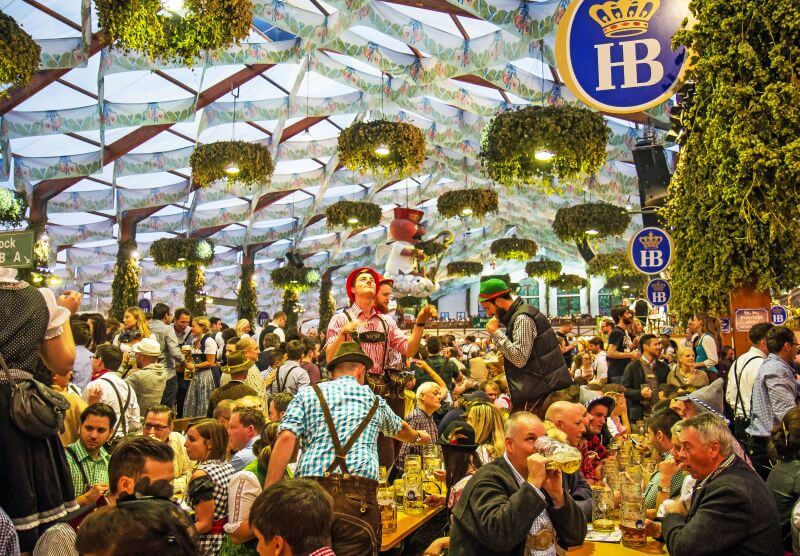
Payment Practicalities: Most tents accept credit cards, but cash remains the preferred method. Beer gardens and smaller stalls may be cash-only. Budget approximately €50-70 per person for a few beers and a meal.
Stay Safe and Comfortable: Drink water between beers, eat hearty food, and know your limits. Bring a light jacket for evening temperature drops, and consider rain protection. The festival has excellent security and medical services if needed.
On a budget? Bring Your Own Food: Like in all Munich beer gardens, including the famous Augustiner Keller, a little-known rule allows you to bring your own food to the Oktoberfest beer gardens (though not inside the tents). Due to strict bag policies, you can’t bring large containers, but you can purchase a sandwich or potato salad from cheaper stalls and bring them to your preferred beer garden.
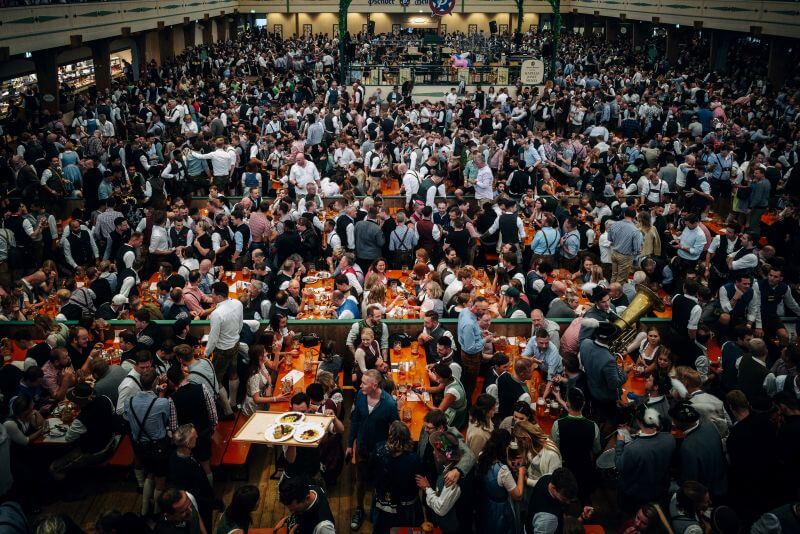
The biggest challenge for many during their first Oktoberfest is figuring out how to get a seat in the popular beer tents, especially during peak times. Here are strategic approaches to ensure you don’t spend your day standing in queues:
Weekday Morning Strategy: Arrive between 10:00-11:00 AM on weekdays for the most relaxed experience. You’ll easily find seats, enjoy shorter queues for food and drinks, and experience the tents before they get rowdy.
Weekend Warrior Approach: If visiting on weekends, you have two options:
The Early Bird: Queue before the grounds open at 9:00 AM and head directly to your chosen tent
The Afternoon Shift: Arrive around 5:00-6:00 PM when the lunch crowd begins departing and before the evening crowd arrives
Reservation Realities: While reservations are recommended, they typically require a minimum group size and a voucher purchase for food and beer. If you don’t have a reservation:
Look for tables marked “Keine Reservierung” (No Reservation)
Be flexible about which tent you visit
Be willing to share tables with strangers (this often leads to the best experiences!)
Check with other tents if your first choice is full
The Beer Garden Alternative: When three tents in a row are full, remember that the beer gardens outside each tent operate on a first-come, first-served basis and offer the same beer and food with a more relaxed atmosphere.
Tour Group Advantages: Joining an Oktoberfest tour can provide guaranteed seating as many tour group operators have pre-arranged reservations with specific tents. This can be particularly valuable during weekends and evenings.
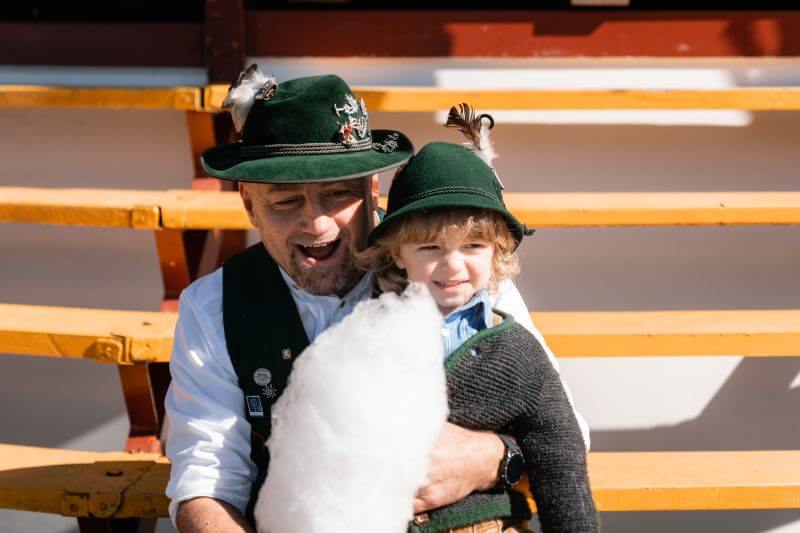
Contrary to common belief, Oktoberfest Munich Germany offers wonderful experiences for families with children. Tuesday is officially designated as a family day with reduced prices on rides and attractions until 7:00 PM.
Best Times for Families: Weekday mornings and early afternoons are perfect for exploring with children. The atmosphere is calmer, queues are shorter, and you’ll find plenty of space in the beer tents before the evening crowds arrive.
Kid-Friendly Attractions:
The Ferris wheel offers spectacular views of Munich and the Alps on clear days (€10 per ride)
Traditional carousels and gentler rides in the historic section
The Kälberhalle tent offers a puppet show at 11:00 AM daily
The Oide Wiesn section recreates the historical festival with traditional games and performances
Decorated gingerbread hearts make perfect souvenirs
Non-Alcoholic Options: Every tent serves alcohol-free beer, soft drinks, and water. The Kaffeehaferl tent specialises in coffee and cakes rather than beer.
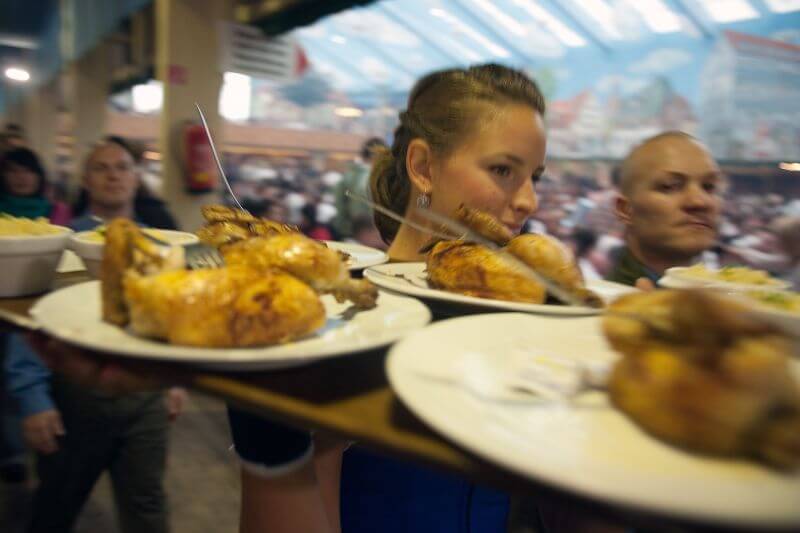
Oktoberfest Munich offers a magnificent showcase of hearty Bavarian food that perfectly complements the beer:
Must-Try Specialties:
Hendl (roast chicken): The festival’s signature dish, crispy-skinned and perfectly seasoned (€12-15)
Pork knuckles (Schweinshaxe): Crispy outside, tender inside (€16-20)
Weisswurst: Delicate white veal sausages traditionally eaten before noon with sweet mustard (€10)
Obatzda: Savoury cheese spread with paprika, perfect with pretzels (€5-7)
Brezn (pretzels): Enormous, fresh-baked and salted (€5-7)
Beer Varieties: Six Munich breweries produce special Oktoberfest beer brews:
Augustiner: Many locals’ favourite, traditionally tapped from wooden barrels
Hofbräu: Perhaps the most famous internationally
Paulaner, Hacker-Pschorr, Spaten, and Löwenbräu: Each with distinct character and loyal followings
For Non-Meat Eaters: Vegetarian options have improved greatly in recent years. Most tents now offer at least one vegan main course. Look for:
Käsespätzle: The Bavarian answer to mac and cheese
Potato salad and pretzels
Grilled mushroom dishes
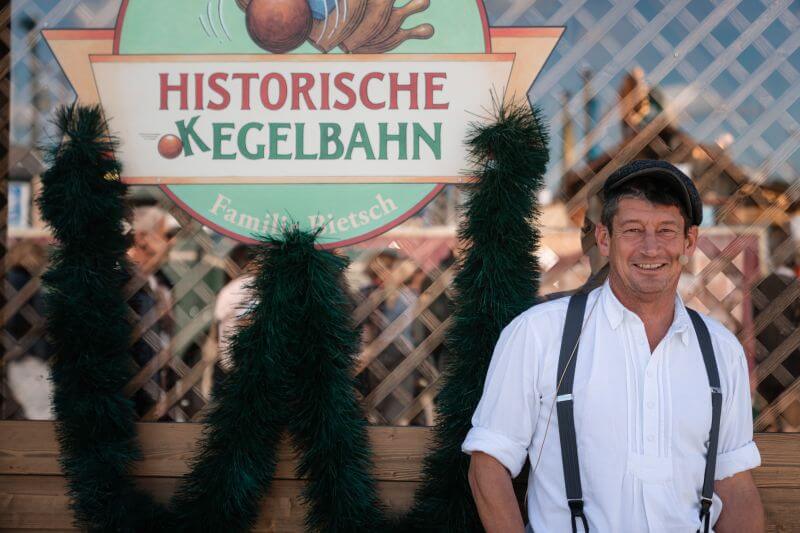
Oktoberfest Munich is steeped in Bavarian traditions that add rich cultural dimension to the celebration:
Music and Performances: Each tent features its own band playing traditional Bavarian music, contemporary hits, and crowd-pleasing classics. The atmosphere builds throughout the day:
Morning: Traditional Bavarian folk music
Afternoon: A mix of folk tunes and familiar singalongs
Evening: Full-tent participation with everyone standing on benches, singing and swaying to classics like “Ein Prosit” (repeated every 20 minutes)
Traditional Dances: Watch for spontaneous Schuhplattler (traditional slap dancing) performed by locals, particularly in the more traditional tents like the Bräurosl.
Costume Competitions: On the first Sunday, the traditional costume parade sees over 9,000 participants parading in traditional attire from Germany, Austria, and other European regions.
Special Days: Throughout the festival, certain days have unique traditions:
Gay Sunday in the Bräurosl tent has become a beloved tradition for the LGBTQ+ community
The crossbow competition in the Armbrustschützen tent honors historical traditions
Various tents host special music events and themed celebrations throughout the festival
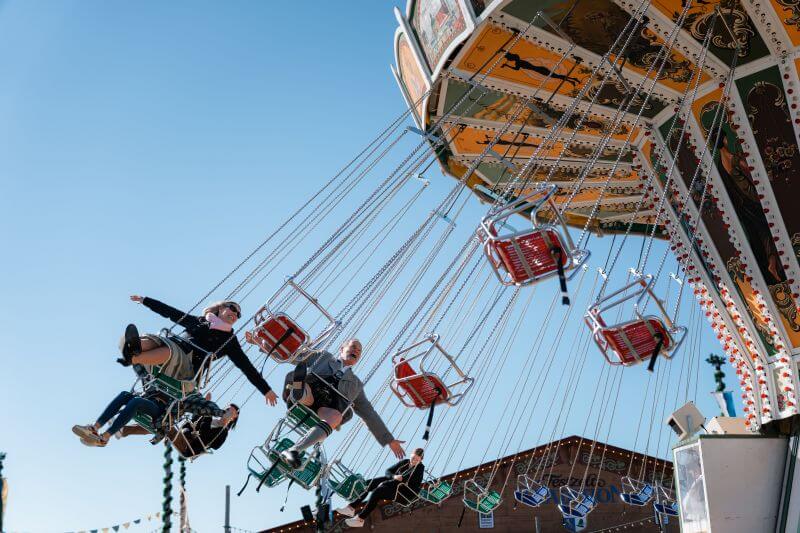
Munich’s excellent public transportation system comes into its own during Oktoberfest:
Public Transport Tips:
The MVV public transport network is excellent, with all-day tickets costing €8.80
Dedicated night buses run throughout Oktoberfest
The train station (Hauptbahnhof) is just a short walk from the festival
Consider staying near a U-Bahn or S-Bahn station for easy access
Most attractions including the Deutsches Museum and BMW Museum remain easily accessible via public transport even during the festival
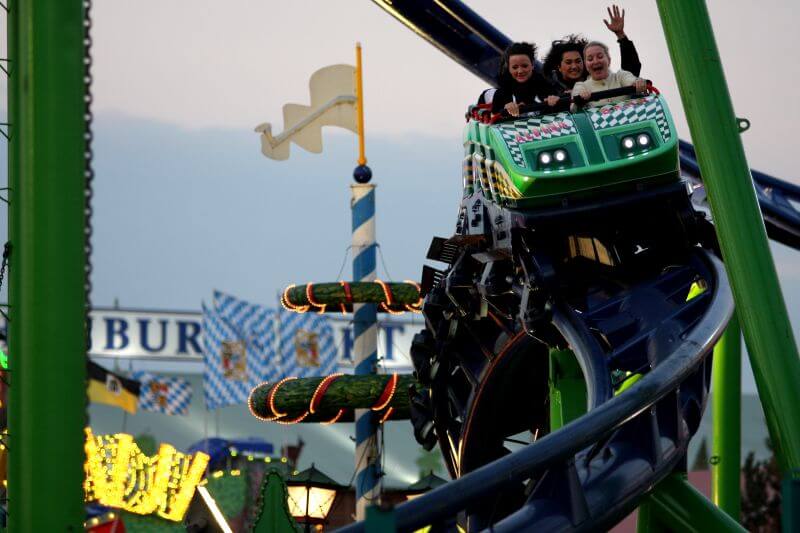
While Oktoberfest Munich can be expensive, savvy travellers can enjoy the experience without excessive spending:
Cost-Saving Tips:
Visit on weekdays when crowds are smaller and prices for some attractions are lower
Take advantage of the “bring your own food” policy in beer gardens
Consider lunch rather than dinner in the tents (same atmosphere, often lower food prices)
Set a daily budget for drinks and stick to it
Explore the grounds and enjoy the atmosphere without spending on every ride
Join guided tours that include some food and drink in their package price
Family days: On Tuesdays, there are discounts on rides and stalls until 7 p.m.
Expected Costs (2023 prices):
Beer: €15-16 per Maß (1 litre)
Main meals in tents: €13-25
Rides: €10-13 per ride
Souvenirs: From €10 for small items to €50+ for quality traditional items
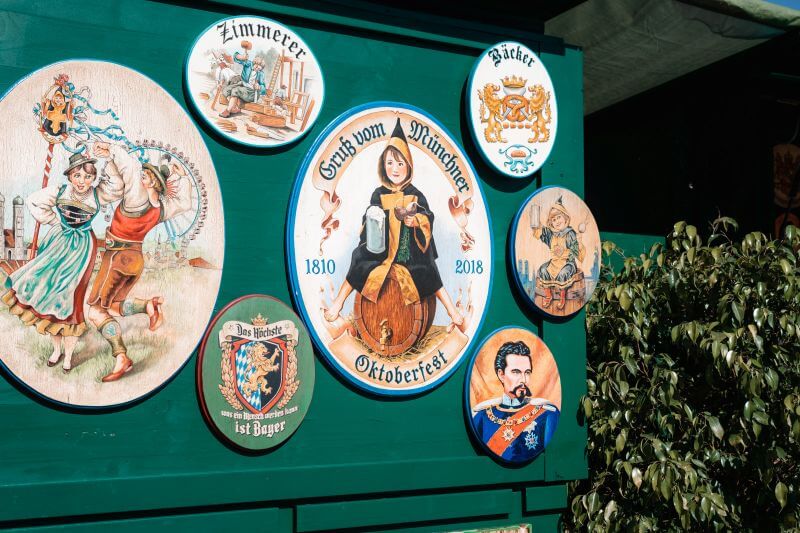
Is Oktoberfest free to enter?
Yes, entry to the festival grounds and beer tents is completely free. You only pay for food, drinks, and attractions.
Are children allowed at the festival?
Absolutely! Children are welcome throughout the festival. Those under 6 must leave the beer tents by 8:00 PM, even when accompanied by parents.
What should I pack for a day at Oktoberfest?
Comfortable shoes, a light jacket in a plastic bag, a small amount of cash, your ID, and phone. A bicycle lock with a number code for securing jackets is a smart addition. Large bags aren’t allowed inside tents.
What’s the weather like during the festival?
September in Munich can be unpredictable. Daytime temperatures typically range from 15-20°C, but evenings can be quite cool. Rain is always possible, so check the forecast.
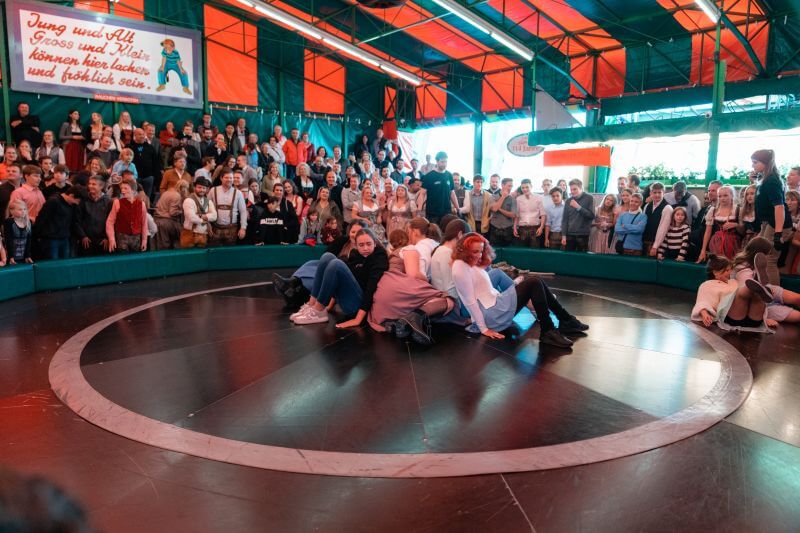
Can I attend without drinking alcohol?
Certainly! Many locals and visitors enjoy the atmosphere, food, and attractions without consuming alcohol. Every tent serves soft drinks and non-alcoholic beverages.
What if I don’t speak German?
No problem! While learning a few basic phrases enhances your experience, most staff speak English, and the festival in the world is very international. The universal language of celebration needs no translation!
How accessible is Oktoberfest for visitors with mobility challenges?
The festival makes significant efforts to be inclusive. Special accessible entrances are available, most tents have wheelchair access, and designated accessible toilets are located throughout the grounds.
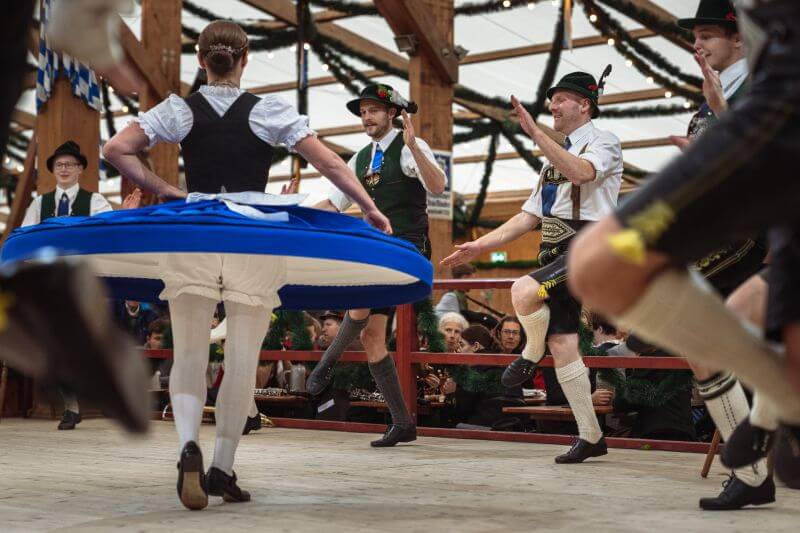
While Oktoberfest Munich Germany is certainly about celebration, observing some basic etiquette ensures everyone has a good time:
Drinking Responsibly: The largest folk festival in the world is about enjoyment, not excess. Pace yourself, eat regularly, and know when you’ve had enough. Security staff are vigilant about removing overly intoxicated visitors.
Table Manners: Standing on benches is permitted (and encouraged during songs), but never stand on tables. Always make room for others when you can, and respect reservations when tables are marked.
Tipping Culture: While not mandatory, tipping your server (Bedienung) is customary. Rounding up to the nearest euro or adding €1-2 per Maß is appreciated, especially since servers work incredibly hard during the festival.
Photography Etiquette: Always ask permission before photographing individuals, particularly in traditional costume. Respect people’s privacy and remember that many locals are there to celebrate, not to be tourist attractions.
Respecting Traditions: Traditional Bavarian clothing is not a costume but cultural attire. If you choose to wear Lederhosen or a Dirndl, do so respectfully rather than as a caricature.
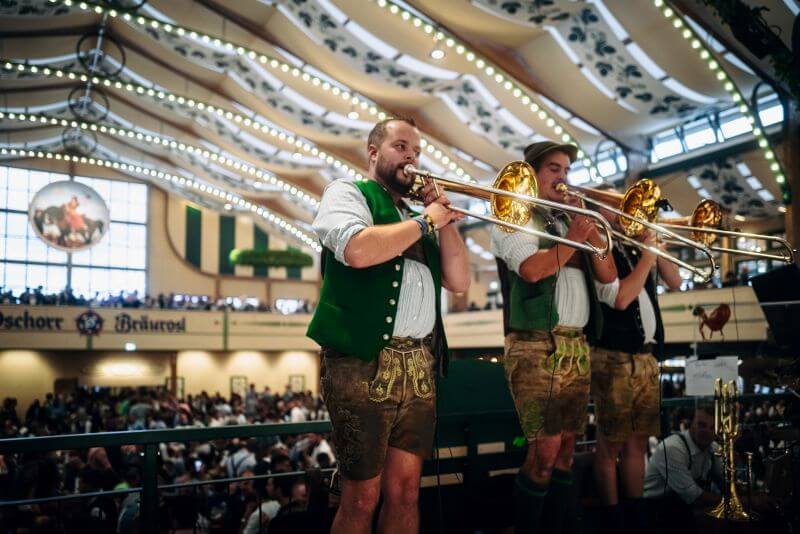
Oktoberfest represents everything wonderful about Bavaria: warmth, tradition, excellent food and drink, and the ability to celebrate life with genuine enthusiasm. It’s a festival where strangers become friends across shared tables, where ancient customs live on in a modern setting, and where memories are made that last a lifetime.
While the scale of the world’s largest folk festival may seem overwhelming at first, this guide equips you with insider knowledge to navigate the celebrations with confidence. From securing the perfect beer tent spot to exploring Munich beyond the festival, you’re now prepared for an authentic Bavarian experience.
So raise your stein, practice your “Prost!” and prepare for an extraordinary cultural immersion that will have you planning your return before your first Oktoberfest even ends. This isn’t just a beer festival—it’s a joyous celebration of life itself, Bavarian style.
Ready to experience Oktoberfest for yourself? Book your accommodation early, secure your beer tent reservations if possible, and prepare for the most legendary folk festival in Bavaria! The world’s largest celebration of beer, culture and tradition awaits your arrival in Munich!
Why not make your Oktoberfest adventure even more magical by exploring the treasures of Munich beyond the beer tents? The city’s fantastic visitor passes are your golden ticket to hassle-free sightseeing! The Munich Card is perfect if you’re primarily focusing on the festival but want easy transport and some discounts—enjoy unlimited public transport and up to 50% off at museums and attractions while you hop between your accommodation and the festival grounds.
Planning to dive deeper into Munich’s charms? The Munich City Pass is your perfect companion! This all-inclusive option grants you free entry to over 45 attractions including the fascinating Deutsches Museum and magnificent royal palaces. With unlimited public transport included, you’ll glide effortlessly between Oktoberfest celebrations and the city’s cultural gems. Grab your preferred visitor card online before arrival—your wallet will thank you, and you’ll experience the very best of beautiful Bavaria!